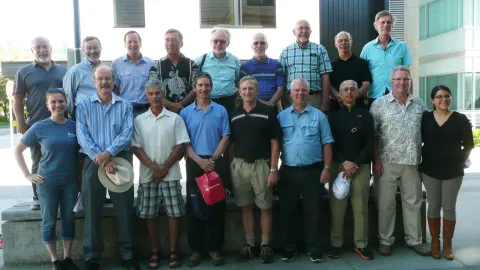Student clubs have a meaningful impact on the University experience. For the Mechanical Engineering class of 1977, the MECH Club wasn’t just about socializing and having fun. It was a place you could go for guidance and support, and where fellow students would always be “on guard” for you.

We recently talked to Ian MacLean and Ken McMillan, two Mechanical Engineering alumni who are part of a group that formed the Elephant Guard Award, a fund that supports students who show significant engagement with the MECH Club.
Academics are only part of the Mechanical Engineering experience," says Ken, "it’s also about being active in Mech Club activities
The club held a deep importance to Ian, Ken and some of the other members of the class of 1977, who grouped together to establish the award in 1978.
“It was the feeling like family or a close approximation to family,” says Ian. “You could always get help, there were always people there who were farther ahead than you on one subject, or there was a subject you were better on that you could help others with. And then there were the social events to balance the stress of classes and labs.”
With contributions of $35,000 over 45 years, the award has supported 84 students and has grown from a $250 award to a $1,000 award. Each year, it is given to two students entering their third or fourth year in Mechanical Engineering. The award is about being active in MECH Club Activities while maintaining a second-class average. “It’s not for academic excellence,” says Ian. “Many awards take a lot of effort to write an essay or apply for, but this one is done with a Mechanical Department Faculty recommendation.”
Now, the Elephant Guard Award contributors are looking at ways to sustain this longstanding initiative that was born from a caring group of students who deeply valued the community and comradery of the MECH Club.
“We are committed to support this award for 50 years and we’d like to see that the award carries on beyond us,” says Ian. “If another 11 people that were 30 years younger than us were interested in an annual contribution, then it can carry on with them for another 20 years. Alternatively, with sufficient one-time contributions, a fund could be created with no future annual support needed.”



